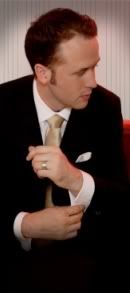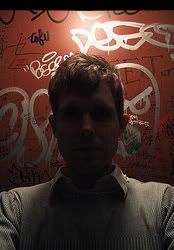INTERVIEW - A Few Sincerely Jolting Moments With Author Sloane Crosley
 Sloane Crosley's new book I Was Told There'd Be Cake presents many unfortunate incidents (and some bizarre triumphs) from her past, beautifully recalled with the sort of wry humor that hovers in New York's atmosphere along with benzene and carbon monoxide. I spoke with Sloane this week about her favorite scary movies, but as usual have preserved her unedited comments here for your enjoyment (speaking of scary movies, I find the diorama video on her site strangely unsettling!)
Sloane Crosley's new book I Was Told There'd Be Cake presents many unfortunate incidents (and some bizarre triumphs) from her past, beautifully recalled with the sort of wry humor that hovers in New York's atmosphere along with benzene and carbon monoxide. I spoke with Sloane this week about her favorite scary movies, but as usual have preserved her unedited comments here for your enjoyment (speaking of scary movies, I find the diorama video on her site strangely unsettling!)
TB: Does making light of personal tragedy in your work wind up changing the way you remember it?SC: For one thing, "tragedy" is a strong word for what happens in these essays, unless you consider quitting one's first job or locking oneself out of an apartment "tragic." But yes, it certainly helps me cope with the way I remember things. Though the truth is, few tragic events in our lives are purely tragic, even as they're happening. But even throughout those more trying incidents, there's always a little bit of funny to be found.[Click here for more]
TB: After the inevitable barrage of receptions and events related to promoting a book, are you ever going to be able to stand the sight of cake again?
SC: Always! I shall never turn my back on cake. Unless I develop a dairy or wheat allergy.SC: I could see The Ursula Cookie being kind of an indie Devil Wears Prada, given the basic dynamics of the relationship I had with my boss. But I personally would like to see Sign Language for Infidels-- the essay in which I accidentally kidnap a small animal-- being made fairly horrific in an over-the-top way. There are a lot of little revelations and visual discoveries in that essay that cry out for some zoomed-in shots and dramatic music.
TB: If any of the essays in your book was given the bastardized Hollywood treatment and wound up being adapted into a horror movie, which one should it be?SC: I love how they involve you in the movie-watching experience -- from the old noir ones to some of the summer blockbusters. If you could conduct a scientific experiment in which you had a subject watch Terms of Endearment, Casablanca, and The Shining, you'd find the most physiological chances occurred while watching The Shining. Even if you cry hysterically or swoon over the other two films, it's the thrillers that hook you differently. If they're well done, they are more of a direct shot into the suspension of disbelief that occurs between the filmmaker and the audience.
TB: What upcoming scary movie are you looking forward to the most?
SC: It's not typically suspenseful, but I am looking forward to the Iron Man movie. I'm a huge Robert Downey Jr. fan and of all the comic books that have been morphed into film, I am least familiar with the basic storyline behind this one. So I expect there to be a few sincerely jolting moments.
TB: Why do you enjoy scary movies or think they're important?



















